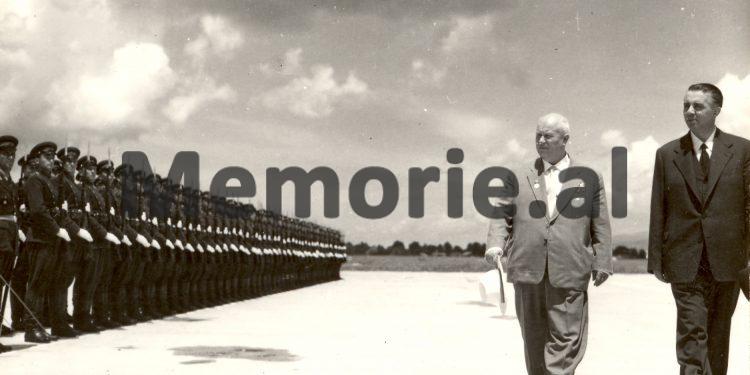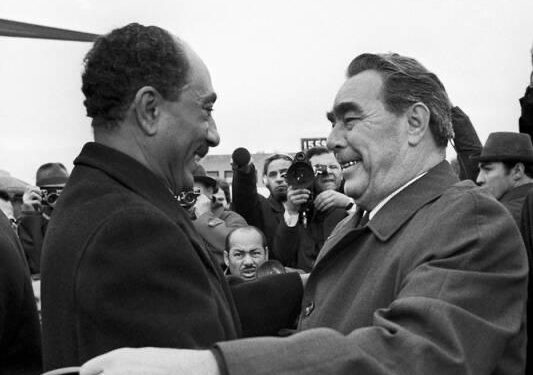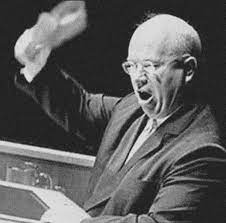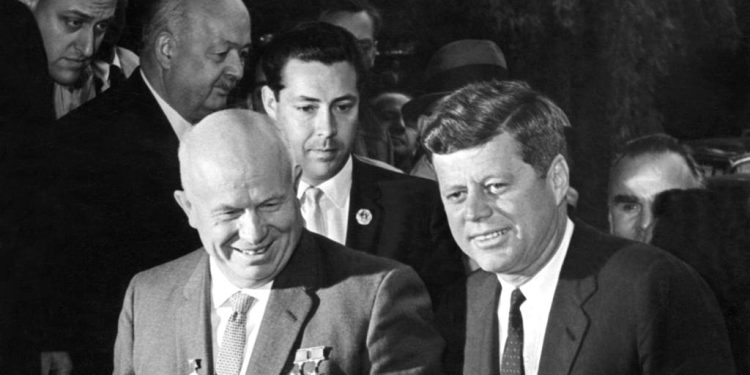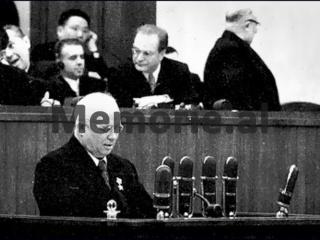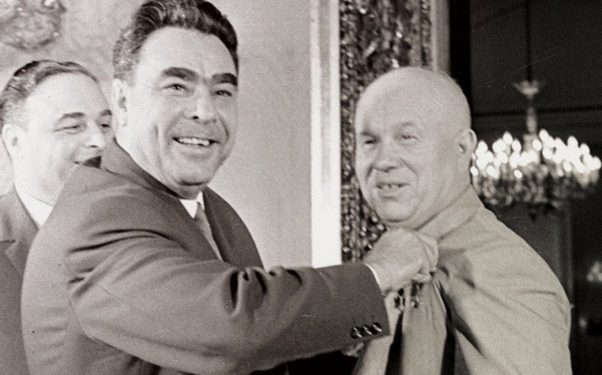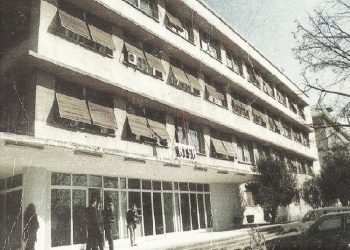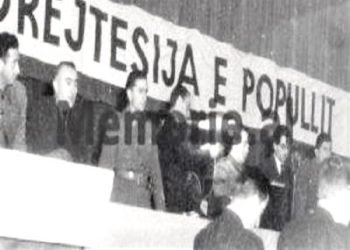By Mark BRUNGA
Memorie.al / The October plenum of the Central Committee of the Communist Party of the Soviet Union in 1964 led to the resignation of the first secretary of the Central Committee of the CPSU and the Chairman of the Council of Ministers of the USSR, Nikita Sergeevich Khrushchev, and the end of the “ice melting” period (ottepel), 1956-1964. A long period of socio-political stabilization had arrived, known as “amullia”, (zastoj), 1964-1985. At the beginning of the 60s, the Soviet Union faced increasing difficulties, and the decisions of the First Secretary of the Central Committee of the CPSU (since 1953) and the Chairman of the Council of Ministers of the USSR (since 1958), Nikita S. Khrushchev, caused dissatisfaction both in the various layers of Soviet society, as well as in the highest levels of power. The food supply situation also worsened.
In 1962, there were riots in Novocherkassk. Khrushchev’s harsh attacks on cultural personalities provoked discontent in intellectual circles. The armament reduction program aroused the displeasure of the military, especially in the context of the worsening conflict with China, for which the party leaders also blamed Khrushchev. The unpredictable character and “voluntarism” of his politics (especially quarrels with communist leaders and administrative reorganizations) aroused dissatisfaction in the party-state denomination. Under these circumstances, Khrushchev’s closest circle decided to remove him from power.
Khrushchev liked, above all, to make decisions with his own head, often without consulting his inner circle. However, not all of these decisions were well thought out and successful. An impetuous and impulsive man, Khrushchev did not tend to accept objections, even when they were cautious and timid. This political style was called “voluntarism”. The strengthening of “voluntarism” in Khrushchev’s policy, the rudeness of the first secretary in communication, led to his isolation, undermined Khrushchev’s authority, both in the people and in the party leadership.
Plans for the removal of Khrushchev were discussed since the spring of 1964, in two groups of apparatchiks. The first – the circle of the secretary of the Central Committee and a little while ago – of the Chairman of the Presidium of the Supreme Council, Leonid Brezhnev. The second circle – “Komsomolas”, younger – Chairman of the Party-State Control Committee, Aleksandr Shelepin and Chairman of the State Security Committee (KGB) V. Semichastnij (in the past, both led the Union Communist Youth of the Soviet Union – “Komsomol”). The idea expressed, in private conversations, for the overthrow of Khrushchev, was supported by the first deputy chairman of the Council of Ministers Andrei Kosigin, the member of the Presidium, N. Podgornij and other members of the Presidium of the Central Committee.
Khrushchev’s opponents had to make an agreement with the Minister of Defense, Marshal R. Malinovskij and the chief ideologist of the party, M. Suslov. A. Shelepini played a leading role in the organization of Khrushchev’s departure. It is also the place to mention the role of Brezhnev, on whom the main responsibility fell, both in case of success and in case of failure. Each of these people was angry about something with Khrushchev, or they were afraid of the unpredictable character of his politics. Some conservative figures could not forgive Khrushchev for unmasking Stalin, who for them, as before, remained a great leader and whose policy they considered right. Using the possibilities of the party-state Control Committee, Shelepin put pressure on the wavering members of the Central Committee of the Communist Party of the Soviet Union.
Until the last moment, the position of the last of the old Bolsheviks who remained in the Presidium of the Central Committee – Andrei Mikoyan – remained unclear. He enjoyed the respect of Khrushchev and the entire party, for his political experience. Mikoyan was an opponent of Stalinism, but Khrushchev’s “voluntarism” also caused him dissatisfaction. Khrushchev was warned, for the preparation of his departure from power. In particular, through Khrushchev’s son, Sergey, he was informed by Golukov, the former head of the escort group of the Chairman of the Supreme Soviet of the Russian Soviet Socialist Federative Republic (RSSFR) N. Ignatov. By Khrushchev’s decision, Golukovi also met with Mikoyan, but this conversation had no consequences.
When Khrushchev and Mikoyan went on vacation to Picunda, (Abkhazia), the Presidium of the Central Committee met on October 12 and decided to hold its plenum, regarding the fact that Khrushchev’s proposals for the November plenum of the Central Committee, previously planned “cause a lot of problems”. This was a formal reason to call Khrushchev to Moscow. Khrushchev was isolated in Picunda. After realizing that his power was being threatened, Khrushchev could go by plane to one of the capitals of the Soviet republics and try to secure there the support of apparatchiks and military loyal to him. But the risk of a party split, with disastrous consequences for the Soviet Union, stopped him.
He submitted to the decision of the Presidium of the Central Committee of the PKBS. On October 13-14, 1964, the Presidium of the Central Committee held a meeting, to which Khrushchev was summoned. Khrushchev’s colleagues in the presidium overwhelmed him with criticism. Initially, Brezhnev criticized Khrushchev for secondary issues, but then they began to accuse the first secretary of all points of his policy. All these claims were summed up in the fact that Khrushchev had violated the collegial nature of the leadership, he made the most important decisions, and not always successful ones, without consulting his fellow party leaders. The most detailed analysis of Khrushchev’s policy was made by Shelepin, who presented the claims, not only on a personal level, but on a political level, arguing that Khrushchev’s course was directed against the interests of the Soviet people.
He stated that; Khrushchev in many respects inherited Stalin’s authoritarianism, pursued adventurous policies, including the Cuban Missile Crisis and unmotivated and frequent changes in agriculture. Brezhnev, who himself had written the theses of the speech (probably not entrusting such an important thing even to close aides), said: “If you, Nikita Sergeevich, did not suffer from such vices, like the thirst for power, the self-deception of your personality, the belief in your infallibility, if You had at least a little modesty, You would not allow the creation of the cult of your individual, and You, on the contrary, did everything that to strengthen this cult”. In the following decade, Brezhnev’s “cult of the individual” would exceed what Khrushchev allowed himself.
On October 14, 1964, the Deputy Prime Minister D. Poljanskij openly raised the issue of Khrushchev’s dismissal from all posts. This decision was approved. Only Mikoyan spoke in favor of leaving Khrushchev in power, but with limited powers. Khrushchev defended himself carefully. Insisting on the correctness of his decisions, at the same time, he recognized some of the criticism as legal and fair and expressed his willingness to accept and take it into account. But now, this could not change the final decision of the “framework problem”. To avoid even greater trouble, Khrushchev was forced to declare his resignation. The declaration was made at the October 14 plenum of the Central Committee of the Communist Party of the Soviet Union.
Unlike in 1957, when Khrushchev managed to oppose the majority of the Presidium, the majority of the Central Committee, (this time its members) were “prepared” by Khrushchev’s opponents. As in 1957, the report was delivered by M. A. Suslovi, who this time denounced Khrushchev. Without discussion, it was decided to dismiss him from all positions and to elect Leonid I. Brezhnev as the first secretary of the Central Committee of the Communist Party of the Soviet Union and A.N. Kosiginit – Chairman of the Council of Ministers of the USSR. After that, Khrushchev was sent into retirement. The decision of the plenum, referring to the “Leninist principles of collective leadership”, affirmed that; Khrushchev created an “abnormal situation”, which makes it difficult for the other members of the Presidium to carry out their duties.
Almost quoting the rebuke that Lenin made to Stalin, Khrushchev’s opponents observed, that he; “concentrated in his hands, great power”. After the October plenum, Khrushchev said worriedly that; Stalin would have shot them, but he himself allowed them to remove him from his post. But Khrushchev, who lost the power struggle, was not killed, but only retired. Perhaps the change of political style, the rejection of the struggle for power for the annihilation of the opponent, was one of the most important results of the “melting of the ice”.
With the resignation of Khrushchev, the period of “melting the ice” ended. Conservative circles of the denomination were confirmed in power. However, the “melting of the ice” did not go without a trace. During the period of “motherhood”, different opinions continued to develop, as well as unofficial movements, contradictions in the political elite, etc. Society did not return to the monolithic Stalinist character, but moved towards Perestroika. The rest of his life, until he died on September 11, 1971, Khrushchev spent under de facto house arrest, in a government villa. Thanks to the help of his relatives, Khrushchev was able to dictate and take his memoirs to the West.
Archival document for the dismissal of Khrushchev from his functions
Proletarians of all countries, unite!
Communist Party of the Soviet Union
CENTRAL COMMITTEE
Top secret
No. P164 / I
Extract from the protocol of the 164th meeting of the Presidium of the Central Committee of the Communist Party of the Soviet Union, on October 13-14, 1964
The problems that arose in the Presidium of the Central Committee, and on measures to restore the Leninist principles of collective leadership in the activities of the Central Committee of the CPSU. To accept that as a result of mistakes and wrong actions of sh. Khrushchev, who violated the Leninist principles of collective leadership, in the Presidium of the Central Committee, a completely abnormal situation has recently been created, which makes it difficult for other members of the Presidium of the Central Committee to carry out the tasks of leading the party and the country.
Sh. Khrushchev, holding the posts of the First Secretary of the Central Committee of the CPSU and the Chairman of the Council of Ministers of the USSR, after concentrating in his hands great power, on a number of occasions, began to get out of the control of the Central Committee of the CPSU, no longer took into consideration the opinion of the members of the Presidium of the Central Committee and the members of the Communist Party of the Soviet Union, solving the most important issues without the necessary collective discussion.
Showing a lack of patience and rudeness towards the members of the Presidium and the Central Committee, ignoring their opinion, sh. Khrushchev allowed a series of big mistakes in the practical implementation of the line determined by the decisions of the XX, XXI and XXII congresses of the CPSU. Presidium of K.Q. of PKBS, considers that with the created negative personal qualities, as an employee, with advanced age and deteriorating health sh. Khrushchev, is unable to correct the mistakes allowed by him, and non-partisan methods in work. Considering also that sh. Khrushov submitted a request, the Presidium of the Central Committee of the CPSU decided:
- To fulfill the request of sh. Khrushov, for his release from the duties of the first secretary, the member of the Presidium of the Central Committee of the CPSU and the Chairman of the Council of Ministers of the USSR, which is related to his advanced age and deteriorating health.
- To consider it inappropriate, the further merging in one person of the duties of the first secretary of the Central Committee of the CPSU and the Chairman of the Council of Ministers of the USSR.
- To consider it necessary to call on October 14, 1964, the Plenum of the Central Committee of the PKBS.
Charges with the opening of the Plenum sh. Leonid I. Brezhnev.
Assigns comrade M. A. Suslov to deliver the speech on behalf of the Presidium and the Secretariat of the Central Committee.
PRESIDIUM OF THE CENTRAL COMMITTEE OF PKBS
Russian State Archive of Newer History (Rossiyskiy gosudarstvennyy arkhiv noveyshey istorii – RGANI). F.2. Op. 1. D.749. sheets 3-4.
ENVER HOXHA’S POLITICAL DIARY
“This is a palace coup”!
FRIDAY, OCTOBER 16, 1964
I waited for my friends to congratulate me on my birthday. The years are passing one after the other and, with them, the age; our hair is turning white, but our hearts are steel. Sihariq and great joy for us and for all the Marxists of the world. Late last night (October 15, 1964) Moscow gave the news that; Nikita Khrushchev was expelled from the Presidium of the Central Committee of the Communist Party of the Soviet Union and dismissed from the functions of the first secretary of the Central Committee and the chairman of the Council of Ministers of the USSR.
But the others, his friends, have remained in power. They overthrew him, so this is a coup, yes, but it could also be a maneuver. However, this is a big win for us. Meanwhile, our fight against modern revisionism continues. All the traitors of Marxism-Leninism, sooner or later, will come to an end.
SATURDAY, OCTOBER 17, 1964
Yesterday was indeed a day of great joy for all Marxist-Leninists of the world and especially for the Albanian Labor Party and the Albanian people. Our heroic party has the legitimate right to rejoice and feel great satisfaction, because it fought heroically, with great Marxist-Leninist maturity, against modern revisionism in general and against Khrushchevism and Titism in particular.
Against the Party of Labor of Albania, the first Khrushchevian fire was opened, this fire was made general by all modern revisionism, took on a breadth and depth never seen before, turned into a raging ideological, political, economic, diplomatic crusade, military against the Labor Party of Albania, the Albanian people and the People’s Republic of Albania.
Our party responded to the fire they opened, stood to this fire, as a mature Marxist-Leninist bravery and not only did not kneel, but fought arrogantly in the first place and became an example of the flag. With this, she won the trust, admiration, respect and support of all the Marxist-Leninist parties, which stood in the right positions, and of all the Marxist-Leninists and revolutionaries of the world.
Our righteous, unbending heroic struggle continued for years, and every year, it has been filled with victories for our Party. These victories decorate her steel chest, like bright medals that will never be darkened. Foot by foot we followed, unmasked, fought mercilessly, modern revisionism, Khrushchev’s traitorous group, Tito’s traitorous group and all other revisionist groups. We strongly contributed to the unmasking of their all-encompassing treachery. We firmly believed that the traitor would be defeated, and the manner in which it became his is not to be wondered at, but the dismissal of the traitor from his posts so soon, and especially by his comrades, was unexpected for we.
This is a palace coup. Just as Nikita Khrushchev organized his coup, when he eliminated Molotov, Kaganovich, Malenkov from the leadership, just as he tried and executed Beria, just as he eliminated Zhukov, so his comrades eliminated Khrushchev himself. The organization of the coup, as it appears from the first data, was done in a conspiratorial manner and the traitor and his closest loyalists did not know anything, or were put in such a situation that they did not have time to warn or to take measures. Later, in time, the facts will clarify everything. Memorie.al




